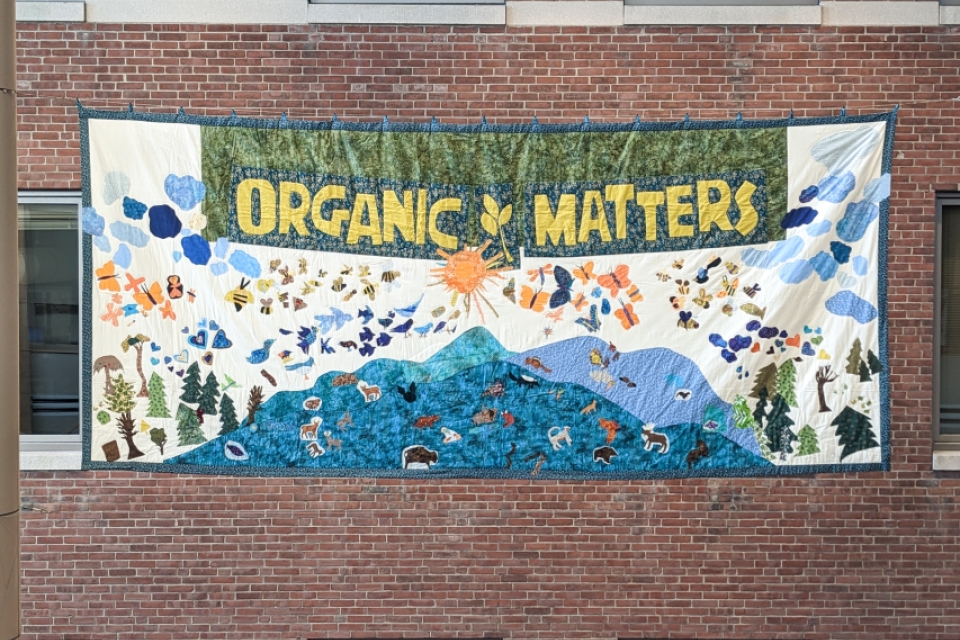A Recap of the 41st Annual NOFA-VT Winter Conference
This past weekend folks from all over Vermont and the Northeast gathered at the University of Vermont for two days packed with workshops, networking, learning, listening, and delicious food at the Northeast Organic Farming Association of Vermont (NOFA-VT)’s 41st annual winter conference. The theme of this year’s conference was “Back to the Roots,” which places emphasis on “returning to, nourishing, and regrowing our roots,” as stated by Grace Oedel, NOFA-VT’s Executive Director, in her opening speech for the weekend. This theme was especially resonant considering that this was the conference’s first time being held in-person since 2020.
Food-system advocates, from farmers and homesteaders to educators and students, as well as folks from both our Community & Marketing and Produce departments, connected in over 40 different workshops on Saturday. Sessions varied from do-it-yourself hands-on opportunities to organizing and food access talks to tools for farm businesses.
I had the opportunity to attend the NOFA-VT Winter Conference for the first time, and I was astounded by the variety of offerings, as well as the excitement that could be felt throughout the gathering space by attendees who were eager to be able to meet in-person again. The day kicked off in UVM’s Davis Center with a keynote address from renowned activist Winona LaDuke. Winona LaDuke’s presentation “Restoring the Covenant: Native Seeds, Communities, and Respectful Relationships,” was incredibly engaging and touched on her experiences on the White Earth reservation in Northern Minnesota, her work as an Indigenous women on environmental justice, especially pertaining to food access and sustainable materials, and her work on her Hemp and Heritage Farm.
After a standing ovation for the keynote presentation, attendees split for the first of three workshop sessions of the day. I first attended the Migrant Justice’s informative session on their Milk With Dignity Campaign, whose Standards Council was one of City Market’s 2021 Seedling Grant recipients. The Milk With Dignity Campaign centers around fair labor practices and protection for migrant workers on dairy farms in Vermont. Farmworkers involved with the project also gave their testimonies about what the project means to them as well as what it means to our local food system within the greater Burlington area. As someone who is just beginning to learn about the dairy industry’s impact on our food system, the presentation was not only important to understand the campaign’s next steps but also helped to inform me of the impact of their mission, as 80-90 percent of employees on Vermont dairy farms are migrant workers.
As the first session ended, attendees gathered for a hearty lunch made with plenty of local and Made in Vermont ingredients. The lunch break also offered affinity group meetings, seed swaps, film screenings, and exhibitor tables to visit. Following lunch, sessions two and three took place. For the second session, I attended “Grass-Fed: How Regenerative Grazing Can Restore Soils and Stabilize the Climate,” held by Ridge Shinn, the Executive Director of the Northeast Grass-fed Beef Initiative. He highlighted the health benefits of grass-fed beef as opposed to corn-mix fed beef, such as antioxidants and high omega-3 content. He put into simple turns for us folks who are not as well-versed in his area of expertise, “you are what your food ate.”
Finally, I attended Cultivating Community Herbalism: Medicinal Plant Gleaning Partnerships that was held by Kara Buchanan and Katherine Elmer of Spoonful Herbals along with a group of panelists from Shelburne Farms, Rock Point Commons, Intervale Center, and Intervale Community Farm. I was curious as to how invasive plants and herbs that can be found in our community could contribute to local food access and health, and they delivered! The workshop served as a great introduction to the courses on herbalism that Katherine occasionally teaches here at City Market. The course integrated land stewardship efforts, as well as how to cultivate herbs and flowers to create tasty dishes and nurturing salves. All in all, it was incredibly informative as someone with little knowledge of herbalism with hopes to learn more in the future regarding the topic.
When asked about their experience, Keaton Knowles, City Market’s Community Engagement Coordinator, said, “My goal as an attendee was to hear about ideas, initiatives, and issues regarding food access.” Keaton continued by saying, “The workshop I attended was hosted by a panel of farmers—both animal and crop—who told an overflowing room of participants all about how they have worked to bring culturally responsive food to the people who live (and shop, and cook, and eat) here. The panelists addressed everything from local halal chicken to locally-grown African eggplants.” Keaton also attended a workshop that highlighted a few local groups/organizations that work to increase local food access, as well as the workshop on community herbalism. Keaton added about the conference, “Altogether Winona’s keynote, these three workshops, and all the other moments between left me feeling inspired and eager, curious and connected, fulfilled and emboldened.”
The 41st Annual NOFA-VT Winter Conference was a wonderful opportunity to get back to the roots of why we all choose to gather. NOFA-VT aims to “promote organic practices that build an economically viable, ecologically sound, and socially just Vermont agricultural system that benefits all living things.” If you are interested in learning more about NOFA-VT, or about volunteering with them, email info@nofavt.org. If you already are volunteering with NOFA, consider joining our Member Worker Program to receive a discount at our store and support our local food system further.
